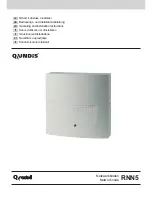
ETHERLINK II - Repeater
Manual
Page 64 of 106
RCONF
Configuration of the remote device is not compatible with the configuration of the
local device (for example, the local device is configured to transmit Ethernet
data, while the remote device is configured to transmit two E1 streams)
Definitions (Ethernet):
LOS-E
Loss of signal on the Ethernet interface
Option: T
– enable the continuous updating of the table of actual alarm statuses.
4.6.4.7
<AСO [GROUP ON/OFF])> command
The <AСO> command without additional parameters lists deactivated alarm relays.
CO_FMM>ACO
ETHERNET
CO_FMM>
The <ACO [GROUP ON/OFF]> command activated/deactivates the GROUP alarm relays.
Available groups of alarm relays:
ETH or ETHERNET
All Ethernet ports
DSL1 or XDSL1
1
st
DSL channel
DSL2 or XDSL2
2
nd
DSL channel
DSL3 or XDSL3
3
rd
DSL channel
DSL4 or XDSL4
4
th
DSL channel
DSL or XDSL
All DSL channels
RCONF
RCONF alarm
RR_01_FMM>ACO DSL-1 OFF
ETHERNET
RR_01_FMM
The deactivated alarm relay does not generate urgent or non-urgent alarms (i.e. does not affect
the color of LEDs on the front panel and alarm relay statuses).
For generators, alarm relays DSL and Ethernet can be deactivated.
Note: By default in all configurations, the Ethernet alarm LED is blocked. By typing this
command, the GROUP parameter can not contain several groups of alarm statuses.
4.6.4.8 <STARTAL ON/OFF N> command
The <STARTAL ON/OFF N> command starts the analog loopback at the line interface of the
device with the number N (<STARTAL ON 1> starts the analog loopback at the DSL1
interface). The <STARTAL OFF N> stops this loopback.
For single-channel modems, the <STARTAL> command is enterd without the parameter N.
CO_09_FMM>STARTAL ON 1
Analog loopback started
CO_09_FMM>STARTAL OFF 1
Analog loopback stopped
CO_09_FMM>
















































